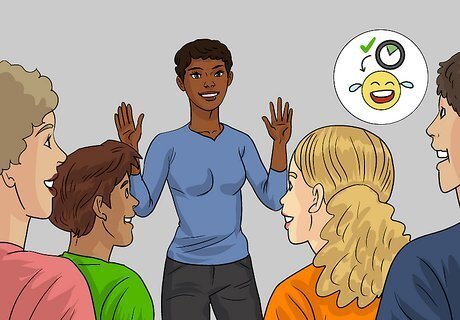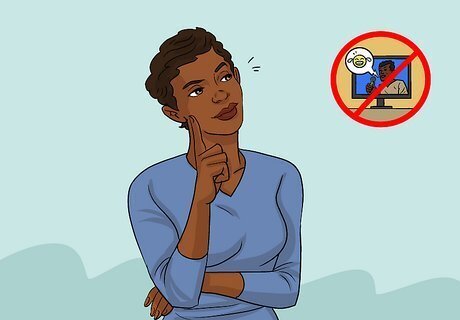
views
Opening up and Discovering Your Sense of Humor

Start by loosening up! Being too uptight and self-conscious are roadblocks to developing and communicating a natural sense of humor that is relatable to other people. Remember that laughter is contagious, so if you carry yourself in an open and humorous way people will be ready to laugh. To break the ice, you may follow the lead of others if you need to. Try smiling and laughing more.

Get comfortable with yourself and your opinions about life. Everyone has opinions about life, and in many cases, opinions can be humorous to other people. People who are naturally funny are typically willing to find humor in both themselves and their opinions. If you are too uptight or self-conscious, it will be difficult to find humor in such things. Think about opening up to others by sharing an embarrassing story about yourself. Be cautious, however, as self-deprecating jokes could make you or others feel uncomfortable. Stick with something that is in good taste.

Look for humor in everyday events. Many comedians focus on the world around them to find comedic material. Others look to their past experiences, such as their childhood, or past relationships as a way to make people laugh. Try making a goal of noticing 5 funny things per day that happen to you. Through this technique, you will begin to see humor in mundane situations that everyone will appreciate. Try to find inspiration and material in the absurd and strange aspects of everyday life. What do you see strange in popular music, fashion, the holidays, and current events?

Visit with a naturally funny friend or acquaintance. We all have friends who are always good for a laugh. What is it that makes them funny? When you see them, pay careful attention to what makes them funny. Is it their tone of voice, body language, content, general demeanor, or something else that makes them naturally funny. Identifying what is that makes them funny will provide clues for how you can be naturally funny as well. Make a habit to spend more time around funny people, and offer to share a funny story or joke of your own.

Research comedic styles. Different comedic styles appeal to different people. Some people enjoy sarcastic and witty comments, others are good with jokes, some like impressions, and others still enjoy funny actions. All of these are legitimate methods of being funny, but it is best to pick something that fits your personality to be naturally funny. Anecdotal comedy refers to funny personal stories that may or may not be embellished. Dry humor is delivered with no expression and matter-of-fact, while the material itself is very funny. Hyperbolic comedy is characterized by massive exaggeration. Ironic comedy is when the meaning of the joke is the opposite of the actual meaning.

Practice being funny. Make it your goal to say or do something that makes someone laugh once a day. A good sense of humor does not emerge overnight, and professional comedians often spend years developing their unique style. By starting small, you will be on your way to being naturally funny in general conversation. Do not be afraid to share something you think is funny. While others will not always understand your humor, you can use their reactions to help improve your style, content, and timing. Reflect on what makes you laugh. If you find something funny, share it with a friend who you think will find this funny as well. Share a funny episode from a movie, television show, book or comic strip.
Being Funny in a Social Situation

Feel out your audience. Be aware of what kind of people you are speaking with, and what makes them laugh. Remember that just because you think something's funny, it does not necessarily mean that the people around you will. You need to know your audience before you can make them laugh! Be aware that humor changes with age. Older individuals are less likely to laugh at sexual or aggressive types of humor, while the right younger audience may appreciate it. Note that inside jokes, particular group stories, or practical jokes are usually best shared with close friends. You do not want to make someone feel left-out because they don't understand the context. Unless you share similar views, avoid joking about religion or politics. Use humor to make people feel more comfortable and positive, do not single them out or belittle their appearance or beliefs.

Work on your timing when telling a story or joke. Professional comedians say timing is everything and key to comic delivery. Stories and jokes are made more funny when the teller pauses right before the punchline to build drama and anticipation. You can also wait to laugh until a couple seconds after the punchline, that way people can never be sure if you are joking or not. Always give your audience time to laugh before moving on to a different topic. If you notice something funny, do not wait too long to point it out. Seize the moment! Asides, which are sarcastic or funny comments inserted into conversation, work well when delivered quickly. Keep stories short and simple, as too much background or too many tangents will distract the audience.

Make jokes at your own expense. Audiences appreciate when you make yourself the target of comedy. It will help them open-up and they will find it easier to laugh at both you and themselves. As a result, people will begin laughing and social anxiety will be reduced. It is not recommended that you begin by making jokes about someone else. If you are with someone who is able to laugh at themselves, you can gently poke fun at them after you have done the same to yourself. Make sure you don't go too far, as this will turn a light-hearted situation into an awkward one.

Target well known subjects that won't be harmed. Poking fun at authority figures, such as politicians, celebrities, or (former) bosses is usually safe. Do not make jokes at the expense of people people who are physically or cognitively disabled, or dealing with a difficult experience such as divorce, death, illness, or sexual assault. A good rule of thumb is to punch up, not down. Making fun of a person or entity in a position of power, e.g. a bully, is punching up. Making fun of a person or entity that lacks power, e.g. an oppressed group, is punching down. Punching up challenges the status quo, while punching down reinforces it.

Avoid memorizing and re-telling older jokes. Telling well recited jokes, such as knock-knock jokes or inappropriate jokes, will turn people off to your sense of humor. In addition, trying to tell a joke you heard on TV or found online will appear rehearsed and unnatural. Stick with your own observations.
Being Naturally Funny at Work

Use humor to integrate yourself into the workplace. Remember that taking yourself too seriously can actually hurt your relationships with your colleagues. A good sense of humor, combined strong work ethic, have been shown to be important traits in successful leaders. By being funny at work, you can enhance your reputation there.

Bond with colleagues through humor. Humor can be used to grow group cohesiveness by diffusing negative situations and generating positive feelings. You can use humor to draw attention to things you have in common with co-workers or a boss. This will help you make friends in the workplace and make the workplace more comfortable. If you are trying to are collaborating with someone for the first time, delivering criticism, or supporting a controversial idea or plan, humor can be a great way to get their attention without seeming pretentious or superior.

Be careful with workplace humor. You want to come off as funny, not passive-aggressive or outright offensive. You also want to be able to grab and keep people's attention, but not because they find you offensive. At work, avoid forms of "low comedy" that would be too risky. Possibly offensive topics include physical appearance or shortcomings, oppressed groups (e.g. women and minorities), physical or mental disabilities, and references to bodily functions and sex.



















Comments
0 comment